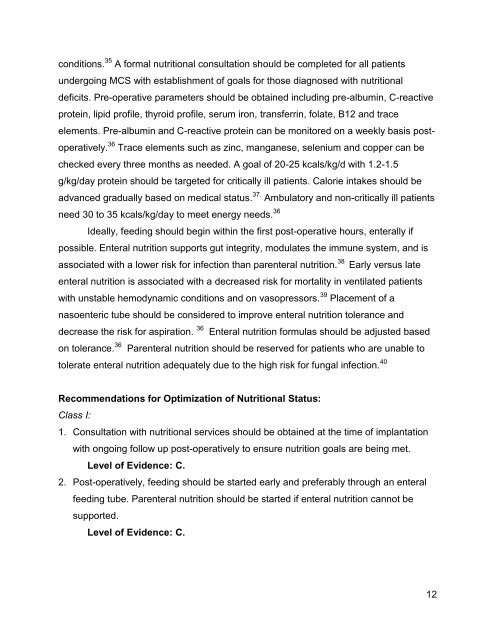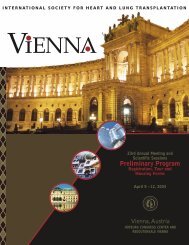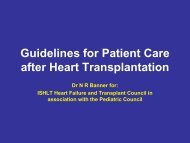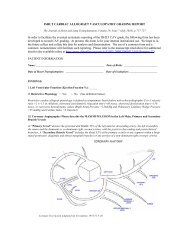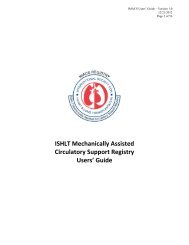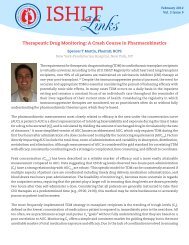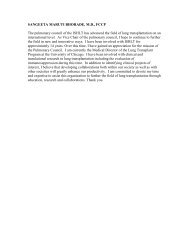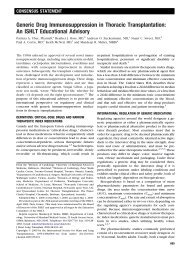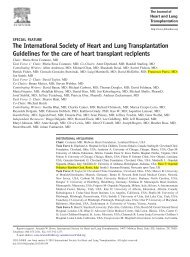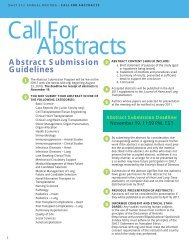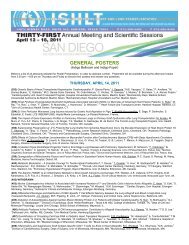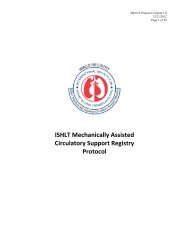Task Force 4: Inpatient Management of Patients with MCSD - The ...
Task Force 4: Inpatient Management of Patients with MCSD - The ...
Task Force 4: Inpatient Management of Patients with MCSD - The ...
Create successful ePaper yourself
Turn your PDF publications into a flip-book with our unique Google optimized e-Paper software.
conditions. 35 A formal nutritional consultation should be completed for all patients<br />
undergoing MCS <strong>with</strong> establishment <strong>of</strong> goals for those diagnosed <strong>with</strong> nutritional<br />
deficits. Pre-operative parameters should be obtained including pre-albumin, C-reactive<br />
protein, lipid pr<strong>of</strong>ile, thyroid pr<strong>of</strong>ile, serum iron, transferrin, folate, B12 and trace<br />
elements. Pre-albumin and C-reactive protein can be monitored on a weekly basis postoperatively.<br />
36 Trace elements such as zinc, manganese, selenium and copper can be<br />
checked every three months as needed. A goal <strong>of</strong> 20-25 kcals/kg/d <strong>with</strong> 1.2-1.5<br />
g/kg/day protein should be targeted for critically ill patients. Calorie intakes should be<br />
advanced gradually based on medical status. 37. Ambulatory and non-critically ill patients<br />
need 30 to 35 kcals/kg/day to meet energy needs. 36<br />
Ideally, feeding should begin <strong>with</strong>in the first post-operative hours, enterally if<br />
possible. Enteral nutrition supports gut integrity, modulates the immune system, and is<br />
associated <strong>with</strong> a lower risk for infection than parenteral nutrition. 38 Early versus late<br />
enteral nutrition is associated <strong>with</strong> a decreased risk for mortality in ventilated patients<br />
<strong>with</strong> unstable hemodynamic conditions and on vasopressors. 39 Placement <strong>of</strong> a<br />
nasoenteric tube should be considered to improve enteral nutrition tolerance and<br />
decrease the risk for aspiration. 36 Enteral nutrition formulas should be adjusted based<br />
on tolerance. 36 Parenteral nutrition should be reserved for patients who are unable to<br />
tolerate enteral nutrition adequately due to the high risk for fungal infection. 40<br />
Recommendations for Optimization <strong>of</strong> Nutritional Status:<br />
Class I:<br />
1. Consultation <strong>with</strong> nutritional services should be obtained at the time <strong>of</strong> implantation<br />
<strong>with</strong> ongoing follow up post-operatively to ensure nutrition goals are being met.<br />
Level <strong>of</strong> Evidence: C.<br />
2. Post-operatively, feeding should be started early and preferably through an enteral<br />
feeding tube. Parenteral nutrition should be started if enteral nutrition cannot be<br />
supported.<br />
Level <strong>of</strong> Evidence: C.<br />
12


